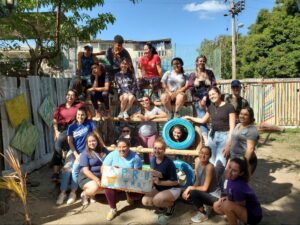
Group Exchange Language Goals
Experiencing an exchange program is a transformative and life changing opportunity where students can immerse themselves in a different culture
You are on our High Schools -> Group Exchanges pages!
Language goals are the stepping stones toward successful language acquisition and effective cross-cultural communication. Depending on the specific exchange program and the students’ knowledge of the language, these goals may vary. Nevertheless, they generally encompass three primary aspects:
To get the full immersion experience, students must strive to develop conversational proficiency in the language spoken in the country, even if their knowledge is limited. Being able to converse at least on a basic level not only facilitates basic communication but also opens doors to deeper connections with locals, interactions, and cultural engagement.

Developing intercultural competencies and becoming multilingual individuals are essential goals for students in exchange programs and are highly valuable in today’s interconnected world. These abilities give students a competitive edge in the global job market since they can communicate with a wider range of people, adapt to international business environments, and engage in cross-border collaborations.
When in an exchange program abroad, students immerse themselves in a different culture which allows them to gain a deeper understanding and appreciation for diverse perspectives, customs, and values. This exposure allows them to develop empathy, adaptability, and the ability to navigate cultural differences with sensitivity and respect.
Language requirements vary depending on the exchange programs and the destination. Sometimes students may be required to achieve a specific score on language proficiency tests or complete language courses to meet the necessary standards. Fulfilling these requirements guarantees that students can make the most of their exchange program experience, both academically and socially.
In certain exchange programs, students are expected to possess basic conversational skills in the language of the destination. This ensures that students can navigate daily interactions, establish connections, and adapt to the local culture, and overall, everyday life. As a result, this would ensure that the students enhance their overall experience and it facilitates meaningful engagement with the host community.
On the other hand, there are some exchange programs that do not assess or place emphasis on the language ability of participants. Even though language skills may not be a requirement in these programs, students still have opportunities to learn and immerse themselves in the destination’s language and culture.

At the high school level, the majority of schools generally do not require a minimum language level to participate in an exchange program. Even though is beneficial to have language proficiency, most of these programs focus on cultural immersion and personal growth, which allows students to explore and embrace new cultures regardless of their language abilities.
Some universities have specific language proficiency requirements for exchange students. These requirements ensure that students can actively participate in academic coursework, engage with peers and professors, and fully integrate into the community of the country they are going to. These language standards enhance the overall exchange experience and academic success.
In conclusion, language goals and typical language requirements play a crucial role in preparing students for a successful exchange program. By setting language goals, students can enhance their communication abilities and fully immerse themselves in the country’s culture. Additionally, meeting the language requirements ensures that students have the necessary language skills to thrive academically and socially during their exchange program.

Experiencing an exchange program is a transformative and life changing opportunity where students can immerse themselves in a different culture

Group exchange programs are a great opportunity for fostering cross cultural understanding and appreciation for other cultures These programs offer

Group exchange programs are life changing experiences where students embark on transformative journeys broadening their horizons and fostering cross cultural

When planning and organizing a group exchange program for your students one of the steps is to carefully consider the

When planning an exchange program one of the first steps is to set the objectives of the experience It will

The safety and well being of students when they travel academically is one of the
Planning a group exchange?
Where should we send you the brochure?
Receive travel and education information directly in your inbox
Where should we send you it?
Receive your brochure
Where should we send you the brochure?